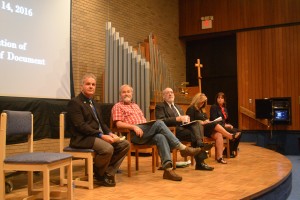Waldorf Celebrates Constitution Day

By Tina Somchit The 5 speakers: Professor Steve Smith, Dr. Paul Bartelt, Dr. James Scarry, Professor Heather Yeoman, and Dr. Traci Francis – Photo by Tina Somchit
By Tina Somchit
Waldorf University celebrated Constitution Day on Sep. 14 in the Recital Hall of Odvin Hagen, led by Dr. Vincent Beach, Vice President for Academic Affairs and Dean of the University.
It consisted of five speakers: Professor Steve Smith, Dr. Paul Bartelt, Dr. Traci Francis, Dr. James Scarry and Professor Heather Yeoman to discuss our rights under the American Constitution. Dr. Beach led as the moderator and the master of the ceremony to operate the discussion, which allowed students to participate and ask questions about each subject that was presented.
First, Professor Smith, an Assistant Professor and the Chair of Religion and Philosophy, spoke about the First Amendment: Freedom of Religion and Separation of Church and State. Smith based his discussion on a book called The Culture of Disbelief: How American Law and Politics Trivialize Religious Devotion by Stephen Carter to present religions role in America.
“The very first words of the First Amendment are words that guarantee us religious freedom,” Smith said. The government cannot establish a religion for American citizens to follow and cannot prohibit any religious practice as long as it does not infringe upon other people’s rights. However, according to Carter’s book, the First Amendment was interpreted backward. “Throughout history in the United States, religion also has no say in politics,” Smith said. He argued that the First Amendment was made to protect religion from politics, not politics from religion. Therefore, religion should have a voice in politics to create variety of voices in the society and establish an ideal democracy.
Second, Dr. Francis, an Assistant Professor of Criminal Justice, spoke about Freedom from Search and Seizure. “The Fourth Amendment does bring together different pieces of the government and each state. They are complicated systems. The amendment balances the federal authorities and rights of each citizen,” Dr. Francis said.
Third, Dr. Scarry, an Assistant Professor and the Chair Department of History, Politics and Geography, discussed Freedom of Speech. It is the freedom of American citizens to publish or express their thoughts or opinions without governmental interference. He gave us an example of freedom of rights movement that happened in Des Moines, Iowa, where three high school students was prohibited from expressing their political opinions in school, to show that this right is important and needed to establish a democracy society.
Fourth, Professor Yeoman, an Assistant Professor of Communications and Humanities, continued with Freedom of the Press. She said this right is important for citizens to receive information without governmental censorship, which in the past, information on newspapers usually got censored from the government if they found it inappropriate. “Freedom of the press or freedom of media’s interpretation now is also now covered books, magazines, movies, video games and other expressive activities” she said. In addition, she mentions that when consuming news, try to read a variety of credible sources to ensure that the information is correct.
Last, Professor Bartelt, a Professor of Biology, ended the discussion with the right to bear arms. He argued that on the Amendment it was stated that people could bear arms, not guns. About 240 years after the Amendment was written, “that list of all arms includes all of those (he had previously mentioned bows and single reload muskets), plus fully automatic rifles, long range sniper rifles, supersonic stealth fighter jets, nuclear missiles loaded onto nuclear submarines, heavy bombers with 15 ton bombs etc,” Bartelt said. He concluded that there should be some restrictions about guns today as the world has changed to protect innocent people from gun crimes. The interpretation of the Amendment from 240 years ago may not be able to apply to real situations of today’s society.
In addition, Dr. Beach has offered a free copy of a pocket constitution for students who are interested in more information, which is available at the Academic Affairs Office.
